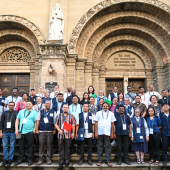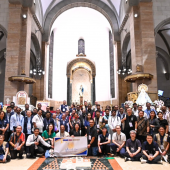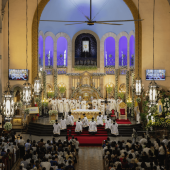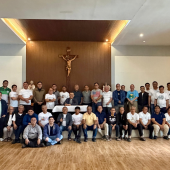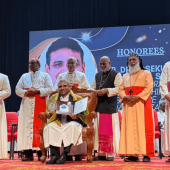SIGNIS Asia Assembly 2025 concludes with a call to ‘Whisper Hope’ in the Digital Age
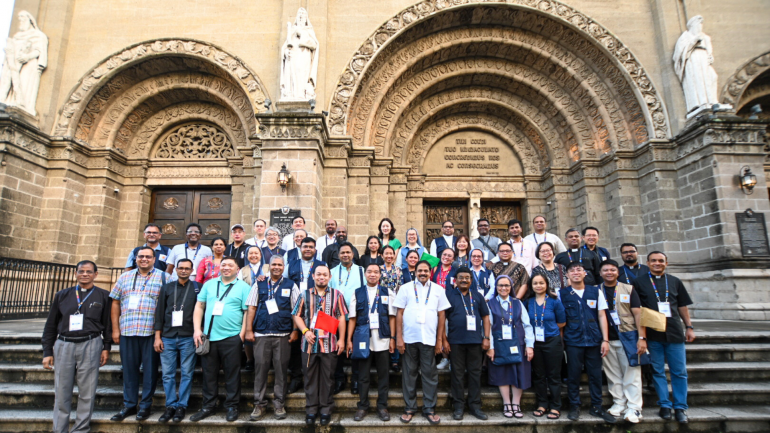
The final day of the SIGNIS Asia Assembly 2025 concluded with creativity, faith, and renewed commitment to responsible and hope-filled communication.
The four-day gathering, held from October 21–24 at the Manila Prince Hotel and St. Paul Center for Renewal in Cavite, brought together 75 media professionals from 11 Asian countries. Inspired by Pope Francis’ message for World Communications Day, the participants reflected on the call to practice “gentle communication” that builds bridges of understanding and peace.
Whispers of Hope in 60 Seconds
The assembly’s final workshop, on Oct0ber 24, titled “Whispers of Hope in 60 Seconds: A Media Sprint,” was a lively showcase of collaboration and imagination. Participants were grouped into diverse teams and tasked to produce short multimedia content, songs, podcasts, reels, or slideshows, conveying a message of hope within just one minute.
Drawing insights from their discussions over the past days, the groups translated reflection into creativity, producing meaningful and inspiring short videos. Each team proudly presented their “Whispers of Hope,” celebrating the spirit of unity and faith. The session concluded with joyful applause, symbolizing how collaboration and shared faith can bring powerful stories to life, even in a single minute.
A Mass of Mission and Meaning
The closing Mass at St. Paul’s Cathedral in San Pablo was presided over by Bishop Marcelino Antonio Maralit, head of the FABC Office of Social Communication. In his homily, Bishop Maralit reflected on the Gospel passage where Jesus rebuked the crowd for interpreting the weather but failing to read the signs of the times.
“Our Lord was speaking not only to the Galileans,” he said, “but to every generation that risks being brilliant in technology, yet sometimes blind to meaning and empty of humanity.” He reminded communicators that they are called to “interpret the present times with the lens of the Gospel.”
He offered five key reflections:
-
Be soul harvesters. Amid data collection, reveal what God is doing in what is happening.
-
Resist indifference. Speak truth with compassion and moral courage.
-
Begin with conversion. Our hearts must be evangelized before our words can evangelize others.
-
Discern as a community. Foster encounter and communion through media.
-
Respond with hope. Let digital progress and AI serve truth and human dignity.
Bishop Maralit urged all media practitioners to humanize technology and communicate with the warmth of the Word made flesh. He invoked the intercession of the Blessed Mother so that all communicators may become true bearers of hope.
A Communiqué of Commitment
As a fruit of their deliberations, the assembly released a statement acknowledging Asia’s painful realities, wars, poverty, misinformation, and digital addiction, and reaffirmed their mission to be “missionaries of hope” in this new media landscape.
The statement highlighted the need for media education, ethical storytelling, and fostering unity through diverse forms of media. “We pledge to whisper the needs of the people, especially the weak and voiceless,” it said, calling for collaboration, dialogue, and truth-driven communication.
RVA
During the assembly, Radio Veritas Asia (RVA) presented a media exhibit showcasing its Laudato Si’ Film-Making Contest. The exhibit attracted significant attention, with many participants expressing interest in joining and promoting the initiative. The contest video, featured in a plenary session, was warmly received for creatively encouraging ecological awareness through storytelling.
As the assembly concluded, participants left inspired to continue their mission as communicators of faith and hope, ready to whisper messages of light and life across the vast digital continent of Asia.
Radio Veritas Asia (RVA), a media platform of the Catholic Church, aims to share Christ. RVA started in 1969 as a continental Catholic radio station to serve Asian countries in their respective local language, thus earning the tag “the Voice of Asian Christianity.” Responding to the emerging context, RVA embraced media platforms to connect with the global Asian audience via its 21 language websites and various social media platforms.









